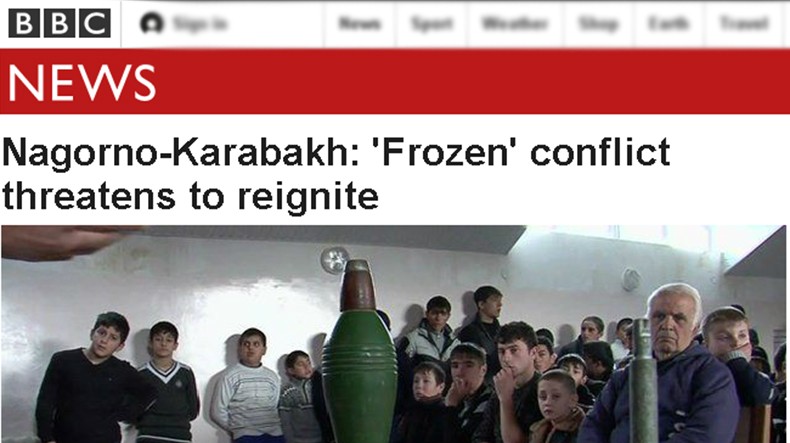
BBC visits Azerbaijan’s side of frontline
This is the first time that the BBC has been allowed to visit Azerbaijan's side of the frontline, as part of a government-organised trip, since the fighting broke out at the beginning of April, writes BBC reporter Tom Burridge.
In April, the BBC reported from the other side of the contact line in Nagorno-Karabakh.
“A two-decade long truce has been shattered by violence in western Azerbaijan. Armenia claims it is not directly involved in a conflict, where it says ethnic Armenians are defending their right to self-determination in the disputed region of Nagorno-Karabakh. But Azerbaijan says its lands were occupied by Armenia, and that it is Armenia doing the fighting,” Burridge writes in the BBC.
According to the source, Azerbaijan's government took the BBC crew and other journalists on a carefully organised trip to several villages and two hospitals to witness destroyed and burnt-out buildings, and to meet the injured as well as relatives of the deceased.
“Clutching a photo of his brother Famil, Ganbar Mustafayev was waiting with three other elderly people, also mourning dead relatives, when our bus arrived.
Although our trip around Azerbaijan's regions near the conflict zone was well planned by the government, a genuine and deep sense of animosity towards Armenia was palpable among local people.
Such anger partly stems from the belief among most Azerbaijanis that Nagorno-Karabakh - as well as a large area of other land within Azerbaijan's internationally recognised borders - has been occupied by Armenia.
The ethnic Armenian authorities in Nagorno-Karabakh claim they are defending their right to self-determination,” the BBC writes.
According to the source, Hikmet Hijaev from Azerbaijan's foreign ministry believes his country has the backing of the international community pointing out that the UN Security Council has adopted four resolutions calling for the withdrawal of Armenian troops from parts of Azerbaijan's territories.
As Tom Burridge writes, the deep-rooted hate in the region on both sides is also a hangover from the bloody war the two sides fought from 1988 to 1994. An estimated 20-30,000 people were killed in that conflict, and there were allegations of human rights abuses by both sides. But when a ceasefire took effect the dispute was still unresolved, and Baku-based journalist Rauf Mirkadirov is "surprised" that the truce has more or less held for 22 years.
According to the source, Mirkadirov believes that, without an agreement, it was "inevitable" that the fighting would eventually resume. He points out that Azerbaijan "has increased its military muscle".
Rauf Mirkadirov says "military rhetoric" linked to the conflict is very popular in Azerbaijan. He notes that the opposition agrees with the government's policy of “liberating territories occupied by Armenia”, which if successful is the best way to increase their popularity.
“The Armenian-backed forces of the unrecognised republic of Nagorno-Karabakh blame Azerbaijan for the sharp escalation in violence in early April. But Azerbaijan points the finger of blame at Armenia.
Foreign Ministry spokesman Hikmet Hijaev claims Yerevan has adopted a pre-emptive strategy "to capture new territories" in order to "guarantee the security of occupied territories",” writes the BBC.
Newsfeed
Videos






























